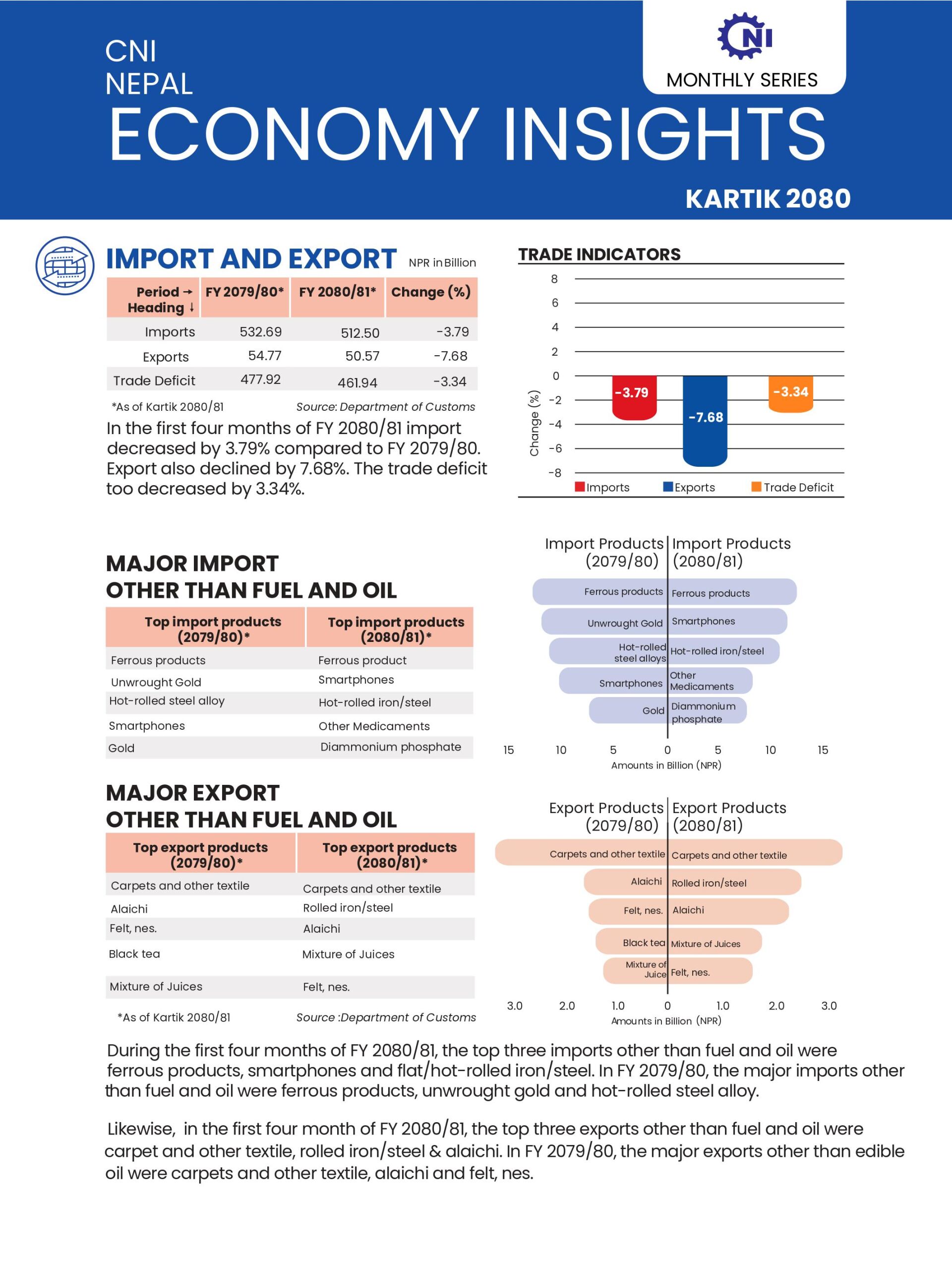
It is in the understanding of the Confederation of Nepalese Industries (CNI) that the provisions of the current capital loan guidance, 2079 issued recently by Nepal Rashtra Bank will not create an industrial and commercial environment in Nepal and may even deteriorate the existing environment. We believe that the ongoing guidance will also adversely affect the swadeshi and Nepal government-owned campaigns such as Make in Nepal.
We would like to remind you that the CNI has submitted suggestions prepared after extensive discussion and study in the draft of the guidelines issued by the Central Bank in order to maintain uniformity in working capital loans, to make the loan approval process and usage transparent. According to the suggestion of the confederation, this guideline is not mandatory for small borrowers who take loans up to 50 lakh rupees, the limit of 1 crore has been changed to 2 crore, the confederation welcomes the positive changes made in the arrangement of audit etc. However, the Confederation would like to draw the attention of Nepal Rastra Bank to the fact that in that suggestion, various other issues raised to prepare the industrial environment and facilitate the operating industries have been exempted.
Due to the instability in world geopolitics, the economic situation of the world is going through an unusual situation. It is well-known that even the economy of Nepal is not untouched by this situation. At a time when the economy is in decline due to Covid and other reasons, the credit limit for the industrial sector is decreasing, this policy has adversely affected the policy of creating an industrial environment decided by the Government of Nepal and Nepal Rastra Bank. This guidance has come from the National Bank to make small business and trade easier and to influence large and medium industries. If this guidance does not support large and medium industries, it seems that it will have a negative impact on the small businesses that are at the beginning and end of the production and supply chain. The confederation earnestly requests that after a certain limit, such small industries and businesses cannot transact business on credit and they should refrain from transacting in cash.
In the first six months of the last financial year, the credit of the private sector increased by an average of more than 82 billion per month, but in the last six months of the last financial year, the average monthly credit increased by only 7.3 billion. It is our understanding that this guidance will further shrink the economy when the economy is shrinking due to other directives issued by the National Bank at various times, as banks and financial institutions are unable to provide loans.
It is a well-known fact that Nepal's business is difficult to predict due to various reasons. In such a situation, it is certain that the industry will be upset by the arrangement that only a 20 percent difference is valid in the projections made by the industry. The Confederation wants to draw attention to the fact that the creditworthiness of the industries is very low and the industries may become bankrupt. Reconsidering the guidance issued by Nepal Rastra Bank on this matter, the confederation requests to increase the gap in the projection in the case of industry.
If more than 20 million working capital loans are required, the loans are classified on the basis of needs and the short-term required loans are limited to 25 percent of the estimated annual turnover. Depending on the nature of the medium and large industries operating in Nepal, the working capital cycle and the current business situation, there is a need for different working capital at different times, so it is necessary to arrange loans accordingly. The maximum limit of 25% is not mandatory in the case of industries.
Looking at the nature of the revolving current capital loan account industry, the provision of zero arrears for 7 days in a row at any time of the financial year is very unreasonable, the federation demands that this provision be abolished. According to the provisions made in the working capital loan guidance, the required working capital of the industry will be reduced and the cost of capital will increase Such provisions do not even seem practical in the case of industry, it will increase the overall industrial cost and the goods and services will become more expensive.
We request that the National Bank should reconsider the current capital loan limit as the system cannot change the limit for 6 months after the approval of the current capital loan limit. Banks and financial institutions have to check current assets and current liabilities at least once every 3 months and mandatory emergency inspection once a year is impractical, as this will increase the administrative expenses, it seems necessary to amend this situation so that it is inspected whenever the bank deems it necessary.
(Payment Security Act) should be formulated and implemented for safe recovery in cases where the seller sells goods through cheque, bill, VCTS or on credit and such amount is not recovered.
The confederation is of the opinion that when there is a policy change by Nepal Rastra Bank, a certain time should be provided for the implementation of the changed policy. The Confederation of Nepalese Industry strongly requests that the current capital loan guidance, 2079 be implemented from the 1st of Kartik 2079 on a regional and gradual basis after further study. Confederation of Nepalese Industry has already submitted its suggestions to Nepal Rastra Bank in this regard.









